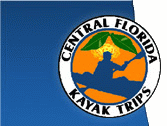
| Lake
Griffin State Park |
 |
| Difficulty: Basic |
Scenery: Good (in park) |
Location: Leesburg,
Lake County |
Distance: 3 miles
Dead River Marsh. |
| Atlas: Page 78 B-3 |
| Last Update: September 2003 |
Canoe OK: Yes |
 Photo-trip
- limited details. Photo-trip
- limited details.
Description
From the mid 1980's to present, Lake Griffin, the main body of
water east of the State Park, has undergone profound changes. Once
a clear-water, sand bottom lake dominated by rooted aquatic plants
and trophy largemouth bass population is now a muck lake, high in
organic sediments with uncharacteristically high algae blooms and
few bass. What happened? According to the State, increased nutrients
and human contamination are to blame.
So why paddle there? Well, with every manure pile is a pony and
this one is called Lake Griffin State Park. The 460 acre park is
very attractive, under utilized and offers a convenient put-in to
the Dead River Marsh. In the marsh you'll find an incredible array
of flora and fauna on floating "islands" made of thickly
matted plants.
In addition to attractive picnic facilities, an amphitheater, boat
ramp and canoe rentals, the park has 40 campsites that accommodate
tents, trailers and motor homes. Each campsite has its own picnic
table, grill, water and electric.
Alligator Alert:
But not the kind you'd expect. Since 1997 a substantial numbers
of Lake Griffin's alligators have been dying of unknown causes.
The number of dead alligators has increased each year, with the
peak die-off occurring in April and May. Tests on the 'gators have
shown a nervous system disease and some sort of toxin may be responsible.
Florida Fish and Wildlife Conservation Commission (FWC) suspect
a type of blue-green algae is the culprit. Another theory is the
die-off is caused by a thiamine deficiency from eating too many
Gizzard Shad (a trash fish). Does it affect humans? Heck, I don't
know, but as long as the 'gators don't eat me; I won't eat them
and find out.
Access
From Leesburg go 2.5 miles north on 441-27 to Fruitland Park. The
State Park is on the right side of the highway. An entrance fee
of $3.25 per vehicle will get you in.
Lake Griffin State Park Photographs
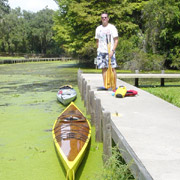
|
Boat / Canoe Launch
Don't let this photo keep you from paddling Lake Griffin State
Park. When we visited, the ramp and canal were clogged with
Duck Weed. The good news is after 100 feet or so, you'll hit
open water. Even better news is since our visit the Park Manager
contacted CFKT and said most of the aquatic plants at the boat
ramp have been removed. |
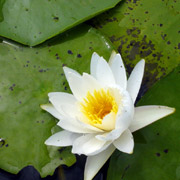
|
Dead River Marsh
The best area to explore in the park is the Dead River Marsh
that separates the upland areas from Lake Griffin. The water
is too deep for most plants to root so they become dense floating
mats that occasionally break free and float into the lake. |
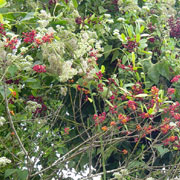
|
Plant Life
Besides the nasty Duck Weed and Pennywort "soup" at
the boat ramp, other aquatic plants you're certain to spot are
Water Lilies, Spatterdock, Hydrilla, Cattails and Water Hyacinth.
On dry land you'll find Live Oak, Hickory, Palm and Pine trees.
|
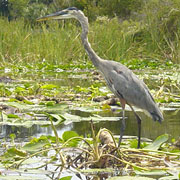
|
Wildlife
The Dead River Marsh holds countless numbers of animals including
otters, raccoon, snakes, alligators and many types of wading
birds such as Great Blue Heron, Limpkins, Anhingas and Moorhen.
If you like to fish, the marsh and lake host Largemouth Bass,
Bluegill and Speckled Perch. |
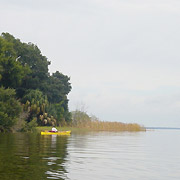
|
Lake Griffin
Lake Griffin, part of the Harris Chain of Lakes, is one mile
east of the park just past the CR 446A bridge. The 16,500 acre
lake is mostly developed on the southern shore and makes a poor
place to dip a paddle. Until the State cleans up this mess,
stick to the west side of CR 446A - you'll be much happier.
|
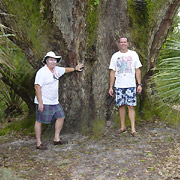
|
Live Oaks
Near the park entrance is a short hiking trail leading to the
5th largest Live Oak in Florida. This particular tree is several
hundred years old, over 10 feet in diameter and 130+ feet tall.
|
|

